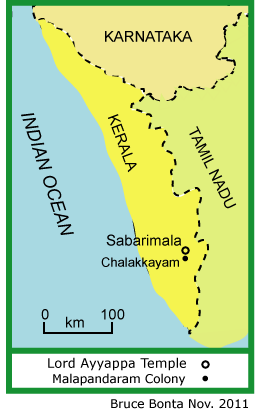Over the past four months, several news reports about Malapandaram hamlets in Kerala have been published by The Hindu, a major paper in India. One appeared just last week.
 On August 2, the newspaper reported that workers at the Kudumbasree Mission, an organization in Kerala dedicated to wiping out poverty by empowering women, had given some relief supplies to a Malapandaram colony at Chalakkayam, to another nearby hamlet at Attathode, and others. All are near Sabarimala.
On August 2, the newspaper reported that workers at the Kudumbasree Mission, an organization in Kerala dedicated to wiping out poverty by empowering women, had given some relief supplies to a Malapandaram colony at Chalakkayam, to another nearby hamlet at Attathode, and others. All are near Sabarimala.
The temple complexes to the Hindu deity Lord Ayyappa in Sabarimala, and associated nearby communities, are visited by about 40,000,000 pilgrims every year. It is probably the most visited pilgrimage site in the world. The annual pilgrimage season to the places associated with Lord Ayyappa began this year on November 17th. The Malapandaram, and other tribal groups, live in the forests and in colonies not too far away from the temple complexes.
Mr. G. Murukan, from the Kudumbasree Mission, visited the colonies to supply food and provisions to the tribal families. He reported to The Hindu that the organization had set up self-help groups in the hamlets to help the women. They are being trained to make artificial ornaments and to do tailoring work. He added that a number of girls in the colonies are anemic.
A few weeks later, another story in The Hindu reported that the Malapandaram women of Chalakkayam, spelled “Malampandarom” by the newspaper, live in constant fear of sexual harassment, both by outsiders and by other residents of their community. The article quotes a young mother as saying, “we seldom sleep at night, fearing sexual harassment.” A tribal youth, she said, had made threatening calls to her. Another tribal man had been arrested four months earlier for sexually harassing two females, according to a middle aged Malapandaram woman.
That same woman said that a number of girls have become mothers in Chalakkayam. Some are as young as 12 to 14 years old. An education volunteer in Attathode said that underage mothers are quite common in the area. He added that three communities, Chalakkayam, Attathode, and another have about 10 mothers who are minors.
The news story reports that the Malapandaram still eke out a living through the sale of products that they gather in the nearby forest interiors. When conditions become difficult for collecting in the forests, such as during the rainy season, the people depend on government handouts, mostly just rice and salt, for their survival.
An article last week in The Hindu reported that the tribal people in Kerala’s Pathanamthitta District, where Sabarimala and the Malapandaram hamlets are located, would be the beneficiaries of a new “Knowledge on Wheels” initiative. The program, similar to the bookmobiles used in rural areas of numerous other countries, intends to develop technical know how among young tribal people by providing periodic access to computers. The computerized bus will visit their colonies from time to time.
Mr. Pazhakulam Madhu, Chair of the Education Standing Committee of the District Panchayat, said that a funding agency, the Global Foundation, wanted to support a project that would develop computer literacy among the underprivileged children. The bus, with its state of the art equipment, will be visiting the Attathode colony in January.
Mr. T.K.A. Nair, an Advisor to the Prime Minister, visited Attahode in the Sabarimala forests last week to attend a function inaugurating the computer bus initiative. He distributed clothing to the tribal children gathered for the occasion. He promised that he would continue to visit Chalakkayam, Attathode, and other nearby colonies in the future.